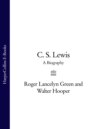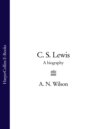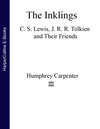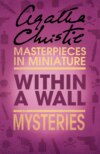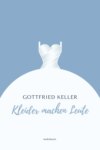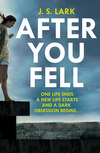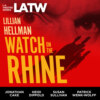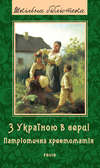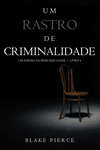Kitabı oku: «C. S. Lewis: A Biography», sayfa 4
Thirty years later, in the preface to George MacDonald: An Anthology, Lewis wrote of MacDonald, ‘I have never concealed the fact that I regard him as my master; indeed, I fancy I have never written a book in which I did not quote from him’, and after describing the purchase of Phantastes, he continued:
A few hours later I knew that I had crossed a great frontier. I had already been waist deep in Romanticism; and likely enough, at any moment, to flounder into its darker and more evil forms, slithering down the steep descent that leads from the love of strangeness to that of eccentricity and thence to that of perversity. Now Phantastes was romantic enough in all conscience; but there was a difference. Nothing was at that time further from my thoughts than Christianity and I therefore had no notion what this difference really was. I was only aware that if this new world was strange, it was also homely and humble; that if this was a dream, it was a dream in which one at least felt strangely vigilant; that the whole book had about it a sort of cool, morning innocence, and also, quite unmistakably, a certain quality of Death, good Death. What it actually did to me was to convert, even to baptise (that was where the Death came in) my imagination. It did nothing to my intellect nor (at that time) to my conscience. Their turn came far later with the help of many other books and men.102
This was the highlight among Lewis’s literary discoveries at Bookham, but he continued with his explorations and was soon reporting with enthusiasm to Greeves on his first reading of Sir Gawain and the Green Knight and Beowulf (both still in translation), Chaucer, Sidney, Tristan (in French, so presumably the medieval ‘prose’ Tristan credited to Helie de Borron), The Song of Roland, the Argonautica of Apollonius Rhodius (in Greek) – which he compared unfavourably with The Life and Death of Jason – Paradise Lost, and Comus – ‘an absolute dream of delight’103 – Shakespeare’s fairy and romantic plays, and a curious work called Letters from Hell, written in Danish by Valdemar Adolph Thisted in 1866, and translated by Julie Sutter in 1885 with an introduction by MacDonald, which may later have given him the idea (though none of the contents) for The Screwtape Letters.
On the more conventionally academic side he was progressing amazingly and Kirkpatrick wrote to Albert Lewis as early as 7 January 1915:
He was born with the literary temperament and we have to face that fact with all it implies. This is not a case of early precocity showing itself in rapid assimilation of knowledge and followed by subsequent indifference or torpor. As I said before, it is the maturity and originality of his literary judgements which is so unusual and surprising. By an unerring instinct he detects first rate quality in literary workmanship, and the second rate does not interest him in any way.104
On 28 March he added that, while still rather behind with Greek grammar, he
has a sort of genius for translating … He has read more classics in the time than any boy I ever had, and that too, very carefully and exactly. In Homer his achievement is unique – 13 books or more of the Iliad and 9 of the Odyssey. It will not surprise you to learn that in the Sophoclean drama, which attains a high level in poetic expression, especially in the lyric portions, he could beat me easily in the happy choice of words and phrases.105
And in a letter of 16 September 1915, he admitted, ‘He is the most brilliant translator of Greek plays I have ever met.’106
As Jack’s time at Bookham drew towards an end much discussion passed between Kirkpatrick and Albert Lewis with regard to his future. There were suggestions that he should take up law or join the Army; but Kirkpatrick’s settled opinion, with which Lewis himself was only too eager to agree, was that he should proceed to the university with the idea of an ultimate fellowship, or failing that of becoming a schoolmaster – though his own private ambition was to be a poet and romance writer.
But this was 1916, and with the war going badly for the Allies, conscription had come in. Lewis discovered that, as an Irishman, he could claim exemption. But he was determined to serve, and this at least gave him the opportunity to join the Officers’ Training Corps and get a commission as soon as his papers came through.
Accordingly, on 4 December 1916 he reached Oxford for the first time, to sit for a scholarship examination, and found comfortable lodgings in ‘the first house on the right as you turn into Mansfield Road out of Holywell’.107 ‘This place has surpassed my wildest dreams,’ he wrote to his father on 7 December, ‘I never saw anything so beautiful, especially on these frosty moonlight nights; though the Hall at Oriel, where we do the papers, is fearfully cold at about four o’clock in the afternoons. We have most of us tried with varying success to write in our gloves.’108
Any fears of the result he may have had were groundless, for shortly after reaching Belfast for his Christmas holidays Lewis received a letter from Reginald W. Macan, Master of University College, informing him that ‘This College elects you to a Scholarship (New College having passed you over)’; and The Times of 14 December listed among the successful candidates, besides ‘Clive S. Lewis, University College’, ‘Alfred C. Harwood, Christ Church’,* and ‘Arthur Owen Barfield, Wadham College’,† who were soon to be among his closest friends.109
Although now a Scholar of Univ., Lewis was not yet officially a member of Oxford University, as he had still to pass Responsions, the entrance examination. This included elementary mathematics as a compulsory subject, and at the end of January 1917 he returned to Bookham for another term to see if Kirkpatrick could instil a sufficient amount of ‘the low cunning of Algebra’ into him, mathematics being a subject that he seemed eternally incapable of mastering.
On the way he visited Oxford again, this time for an interview with the Master of Univ., who, he reported to his father on 28 January, ‘was a clean-shaven, white-haired, jolly old man, and was very nice indeed. He treated me to about half an hour’s “Oxford manner” and then came gradually round to my own business. Since writing last, he has made inquiries, and it seems that if I pass Responsions in March I could “come up” in the following term and join the O.T.C.’110
At Bookham, besides the hated algebra, Lewis extended his studies to German and Italian. The former he found difficult – Chamisso and Fouqué he enjoyed, but Goethe was still beyond him. Italian, on the other hand, came easily to so proficient a Latinist. By 8 February, he was confident that ‘by the end of term I should be able to read it as easily as French’.111
The weekly letters to Arthur Greeves continued as before, full of what he was reading, writing and thinking. A prose romance called Bleheris had been on the stocks the previous term, but this was now cast aside in favour of a new idea which was to take final form ten years later as Dymer. This was at first also in prose, but in modern English as opposed to the archaic style devised by Morris in which his previous efforts had been couched. There was also a narrative poem, ‘The Childhood of Medea’, which, he promised Arthur on 15 February, ‘will leave off where most poems about her begin – shortly after her meeting with Jason. It will describe her lonely, frightened childhood away in a castle with the terrible old king her father, and how she is gradually made to learn magic against her will.’112
Greeves was also planning stories (which he seems never to have written) and was discussing the charms of actual women who were the prototypes of his heroines; but Lewis was still more interested in
The land where I shall never be,
The love that I shall never see,
and went on to disclaim authorship of the couplet (which was later to appear, still anonymously, on the title page of Spirits in Bondage): ‘a beauty, isn’t it,’ he wrote to Greeves on 28 February, ‘but NOT by me – I wish it were. Andrew Lang quotes it somewhere, but I have never been able to discover the author. Whoever it be, he deserves immortality for these two lines alone.’113 The lines, slightly misquoted, were in fact from a poem by Lang himself, inspired by a prose passage from Baudelaire, which he quotes in his History of English Literature (1912).
Religion was also discussed occasionally, though only Arthur, who was a Christian, raised the subject. It bothered Jack’s conscience in later years that he had allowed himself to be confirmed in St Mark’s on 6 December 1914 merely to please his father and to avoid argument. But at the moment Jack was still a determined atheist, and when challenged took up his stand in the anthropological field, citing ‘dying gods’ and ‘fertility rites’ from Lang’s Myth, Ritual and Religion (1899) and Frazer’s The Golden Bough (1890–1915). ‘All religions, that is all mythologies, to give them their proper name, are merely man’s own invention – Christ as much as Loki’, he wrote to Arthur on 12 October 1916.114 When Arthur complained, Jack distinguished between Jesus and Christ, as he wrote on 18 October:
When I say ‘Christ’, of course I mean the historical being into whom he was afterwards converted by popular imagination … That the man Yeshua or Jesus did actually exist, is as certain as that the Buddha did actually exist … But all the tomfoolery about virgin birth, magic healings, apparitions and so forth is on exactly the same footing as any other mythology … As to the immortality of the soul, though it is a fascinating theme for day-dreaming, I neither believe nor disbelieve: I simply don’t know anything at all, there is no evidence either way.115
This agnosticism was enshrined in a poem written in 1917 which ends:
I think, if it be truth, as some have taught
That these frail seeds of being are not caught
And blown upon the cosmic winds in vain
After our death, but bound in one again
Somewhere, we know not how, they live and thrive
Forever, and the proud gods will not give
The comfortable doom of quiet sleep,
Then doubt not but that from the starry deep
And utmost spaces lit by suns unknown
We should return again whence we were flown,
Leaving the bauble of a sainted crown,
To walk and talk upon the hills of Down.116
* In later years they talked of their ‘Pigiebotie’ philosophy. ‘A pigiebotie,’ Jack wrote to Warnie on 2 August 1928, ‘must be conscious of idling and approve of it. He must not merely like to sit still, but he must also like to think of himself sitting still, or even like to think of himself liking to sit still … He is the only true “Quietist”. He sitteth down like a giant and rejoiceth not to run his course. He eateth all things, neglecteth all things, moveth not himself, is not waked up.’ (FL, p. 776)
* Robert Capron (‘Oldy’ or ‘Oldie’) (1851–1911) was born in Brampton, Devon, and received a BA and a BSc from the University of London in 1873 and 1875 respectively. In 1878 he was ordained as curate of Wordsley, Staffordshire, and in 1881 he founded Wynyard School at what is now 99 Langley Road, Watford. In 1882 he married Ellen Barnes (1849–1909) and they had three daughters, Nora, Dorothy, and Eva, as well as one son, John Wynyard, all of whom helped with the teaching while Jack and Warnie Lewis were there. Capron was very successful in teaching the classics in the beginning. However, his increasing mental instability and eventual insanity resulted in his becoming very cruel. Reduced to a handful of students, the school closed in April 1910. Capron died in the Camberwell House Asylum, Peckham, Kent, on 18 November 1911. See his biography in CG.
* Sir William Quartus Ewart (1844–1919), the head of a remarkable family, was the director of the family business, Wm Ewart & Son Ltd., Flax Spinners and Linen Manufacturers. In 1876 he married Mary Heard (1849–1929), who was the niece of C.S. Lewis’s maternal grandmother. Lady Ewart was, then, Flora Lewis’s first cousin. The Ewarts had five children: (1) Robert Heard Ewart (1879–1939) who succeeded to the baronetcy; (2) Charles Gordon Ewart (1885–1936) who married Lily Greeves, sister of Arthur Greeves; (3) Hope Ewart (1882–1934) who in 1911 married George Harding and moved to Dublin; (4) Kelso ‘Kelsie’ Ewart (1886–1966), who lived near Glenmachan; and (5) Gundreda ‘Gunny’ Ewart (1888–1978) who married John Forrest. See The Ewart Family in the Biographical Appendix of FL.
* Dr Richard Whytock Leslie (1862–1931) was the Lewis family doctor.
† Arthur Clement Allen (1868–1957), the headmaster of Cherbourg School, read Classics at New College, Oxford. He founded Cherbourg in 1907, and in 1925 he moved it to Woodnorton, Evesham. It closed when he retired in 1931.
* This was Charicles, or Illustrations of the Private Life of the Ancient Greeks (1840) by the German archaeologist Wilhelm Becker (1769–1846), written in fictional form, with a scholarly ‘excursus’ following each chapter and footnotes citing his original Greek authorities. The passage in question was probably the scene in Corinth with accompanying excursus on the Heterae.
† Gundreda Ewart, one of the daughters of Sir William and Lady Ewart. See The Ewart Family in the Biographical Appendix to FL.
* The Rev. Canon Sydney Rhodes James (1855–1934) was headmaster of Malvern College from 1897 until 1914. See his autobiography, Seventy Years: Random Reminiscences and Reflections (1926).
* Sir Donald Hardman (1899–1982) was Jack’s study-mate in School House. On leaving Malvern he went to Hertford College, Oxford, after which he became a professional serviceman. Edward Anderson (1898–1928) was a member of School House, 1913–17. He served in the war as a 2nd lieutenant. He later moved to Rhodesia. Kenneth Ernest Lodge (1899–?) was a member of School House, 1913–17, after which he served with the Duke of Lancaster’s Own Yeomanry. He remained in the Army.
* William Eyre Hamilton Quennell (1898–?) entered School House the same term as Jack. From Malvern he went to the Royal Military College at Sandhurst, and in 1917 he was gazetted into the 7th Dragoon Guards. After the war he trained as a doctor at St Bartholomew’s Hospital, London. During the Second World War he was a medical officer with the Essex Yeomanry.
† ‘The James’ was Canon James, the headmaster. The ‘Old Boy’ was George Gordon Fraser (1870–1958), the headmaster’s assistant in the management of School House. He was a pupil at Malvern College, 1879–85. He was appointed an assistant master at Malvern in 1901, and in 1917 he became house master of No. 9 House, a position he held until 1927.
* Austin Farrer (1904–68), distinguished philosopher and theologian, was born in London and went up to Balliol College, Oxford in 1923. He took Firsts in Classical Honour Moderations, Literae Humaniores, and Theology. On being ordained a priest of the Church of England in 1929 he served his title in Dewsbury. He returned to Oxford in 1931 as Chaplain and Fellow of St Edmund Hall where he remained until 1935. He was afterwards Chaplain and Fellow of Trinity College, Oxford, from 1935 until 1960 when he became Warden of Keble College. His books include Finite and Infinite (1943) and The Revelation of St John the Divine (1964). He came to know Lewis through the Socratic Club, and he and his wife, Katharine Farrer, became close friends of Lewis’s wife, Joy Davidman. See his biography in CG.
* Alfred Cecil Harwood (1898–1975), who was to become a lifelong friend, was born in London and attended Highgate School. After serving during the war with the Royal Warwickshires, he went up to Christ Church, Oxford in 1919, taking his BA in 1921. In 1923 he became a member of the Anthroposophical Movement founded by Rudolf Steiner, and in 1923 he and his fiancée, Daphne Olivier, became teachers in Michael Hall School, the first Anthroposophical school in Britain. He married in 1925 and devoted the rest of his life to teaching, lecturing and writing. See his biography in CG.
† >Arthur Owen Barfield (1898–1997), a lifelong friend and a member of the Inklings, was born in London and attended Highgate School where he became friends with Cecil Harwood. He served with the Royal Corps of Signals during the First World War, after which he went up to Wadham College, Oxford on a Classical scholarship. He met Lewis during his first year at Wadham. After taking a BA in English in 1921 he wrote a B.Litt. thesis on ‘Poetic Diction’ which became the basis of his book of that title. He became a follower of Rudolf Steiner in 1923 and was a devoted member of the Anthroposophical Society all his life. He married Maud Douie on 11 April 1923, and settled down to a life of literature. However, in 1929 he gave it up to help in the family law firm, Barfield & Barfield, in London. His many influential books include Poetic Diction (1928), History in English Words (1926), Saving the Appearances (1957) and Worlds Apart (1963). His writings about Lewis are collected in Owen Barfield on C.S. Lewis, ed. G.B. Tennyson (1990). See his biography in CG.
NOTES
1 ‘C.S. Lewis: 1898–1963’, ch. 1, p. 1. In 1964 Warren Lewis began writing a biography of his brother, to be based on the old notion of a ‘Life and Letters’. However, on discovering that, of the 230,000 words which made up the book, only 23,300 words were narrative, the publishers hired a copy-editor to revise it. The greater part of the narrative was brought together as a ‘Memoir’ and the book was published as Letters of C.S. Lewis, edited, with a Memoir, by W.H. Lewis (1966). Unfortunately, much of Warren’s original narrative was omitted from the ‘Memoir’ and when we began writing our biography he gave us use of his original book, ‘C.S. Lewis: 1898–1963’; that is what is quoted above. There are two typescripts of the original book, one in the Bodleian Library, Oxford, and the other in the Marion E. Wade Center at Wheaton College, Wheaton, Illinois.
2 Ibid., pp. 3–4.
3 SBJ, ch. 1, p. 13.
4 FL, p. 776.
5 ‘C.S. Lewis: 1898–1963’, p. 11.
6 Ibid.
7 SBJ, ch. 1, p. 6.
8 Ibid., p. 7.
9 Ibid., p. 2.
10 An Experiment in Criticism (1961), ch. 3, p. 14.
11 William Shakespeare, The Tempest (1611), I.ii.50.
12 SBJ, ch. 1, p. 10.
13 Ibid., pp. 8–9.
14 Ibid, p. 11, n. 1.
15 Ibid., pp. 10–11.
16 Ibid., p. 9.
17 ‘C.S. Lewis: 1898–1963’, ch. 2, p. 23.
18 SBJ, ch. 1, pp. 10–11.
19 Ibid., p. 12.
20 Ibid., p. 11.
21 Ibid.
22 Ibid.
23 Ibid., p. 12.
24 Ibid., pp. 12–13.
25 LP III, p. 90.
26 Ibid., p. 89.
27 Ibid.
28 Ibid., p. 102.
29 SBJ, ch. 1, p. 13.
30 Ibid., pp. 14, 15.
31 SBJ, ch. 2, p. 31.
32 LP III, p. 39. This comes from Warnie’s account of Wynyard.
33 Ibid., p. 40.
34 SBJ, ch. 2, p. 26.
35 Ibid.
36 ‘On Three Ways of Writing for Children’, Of This and Other Worlds, ed. Walter Hooper (1982), p. 59.
37 LP III, pp. 161–4.
38 Ibid., p. 194.
39 FL, p. 7.
40 LP III, letter from J. Wynyard Capron of 21 October 1909, p. 191.
41 SBJ, ch. 3, p. 33.
42 Ibid., p. 38.
43 Ibid., p. 40.
44 LP III, p. 222.
45 Ibid., letter to Warnie of 27 November 1910, p. 223.
46 FL, letter of January 1911, p. 16.
47 SBJ, ch. 4, p. 43.
48 Ibid., p. 49.
49 Ibid., p. 47.
50 Ibid., ch. 4, p. 52.
51 Ibid., ch. 5, pp. 55–6.
52 Ibid., p. 56.
53 Ibid.
54 Ibid., pp. 57–8.
55 Ibid., p. 59.
56 Ibid., p. 58.
57 ‘Is Theology Poetry?’ Screwtape Proposes a Toast and Other Pieces (1965; Fount, 1998), p. 35.
58 ‘Religion without Dogma?’ Timeless at Heart: Essays on Theology, ed. Walter Hooper (Fount Paperbacks, 1987), p. 87.
59 LP IV, letter from Arthur C. Allen to Albert Lewis of 2 June 1913, p. 25.
60 Ibid., p. 29.
61 ‘C.S. Lewis: 1898–1963’, p. 25.
62 LP IV, letter of 10 June 1913, p. 30.
63 Ibid., p. 51.
64 William Wordsworth, The Prelude (1850), IX, 108–9.
65 FL, letter of 28 September 1913, p. 31. LP IV, p. 77.
66 ‘C.S. Lewis: 1898–1963’, p. 27.
67 From the fragment of a poem Lewis wrote during the winter of 1913, LP IV, p. 121. One of the lines of the fragment, ‘Ten thousand, thousand points of light’, was to appear only slightly altered in The Magician’s Nephew (ch. 8) as ‘A thousand, thousand points of light’.
68 FL, pp. 50–1.
69 LP IV, p. 153.
70 Ibid., p. 157.
71 ‘Memoir’, p. 25.
72 SBJ, ch. 6, p. 75.
73 Ibid., ch. 7, p. 83.
74 Letter to Roger Lancelyn Green.
75 SBJ, ch. 7, p. 87.
76 Ibid., p. 85.
77 FL, pp. 62–3.
78 SBJ, ch. 8, pp. 91–2.
79 H.M.A. Guerber, Myths of the Norsemen from the Eddas and Sagas (1908).
80 Donald A. Mackenzie, Teutonic Myth and Legend (1912).
81 Paul Henri Mallet, Northern Antiquities (1770; Bohn edn, 1847).
82 Corpus Poeticum Boreale: The Poetry of the Old Northern Tongue from the Earliest Times to the Thirteenth Century, ed. and trans. G. Vigfússon and Frederick York Powell (1883).
83 SBJ, ch. 7, p. 88.
84 Ibid., p. 89.
85 Ibid., ch. 8, pp. 100–1.
86 LP III, p. 305.
87 Ibid., IV, p. 182.
88 SBJ, ch. 9, p. 103.
89 Ibid., p. 105.
90 Ibid.
91 Ibid.
92 Ibid., ch. 9, p. 109.
93 Ibid., p. 112.
94 FL, p. 70.
95 Ibid., p. 78.
96 SBJ, ch. 9, p. 109.
97 Ibid., p. 110.
98 FL, p. 102.
99 LP IV, letter of 12 July 1915, p. 327.
100 LP V, p. 46. The entire poem, ‘Ballade of a Winter’s Morning’, is published in The Collected Poems of C.S. Lewis, ed. Walter Hooper (1994), pp. 234–5.
101 FL, p. 169.
102 George MacDonald: An Anthology (1946), Preface, pp. 20–1.
103 FL, letter to Arthur Greeves of 27 September 1916, p. 225.
104 LP IV, p. 279.
105 Ibid., p. 305.
106 Ibid., V, p. 17.
107 SBJ, ch. 12, p. 143.
108 FL, p. 262.
109 LP V, pp. 159–60.
110 FL, p. 267.
111 Ibid., p. 275.
112 Ibid., pp. 277–8.
113 Ibid., p. 284.
114 Ibid., pp. 230–1.
115 Ibid., pp. 234–5.
116 The entire poem, ‘Couplets’, of which this is a part, is found in Collected Poems, pp. 140–1.
Ücretsiz ön izlemeyi tamamladınız.
